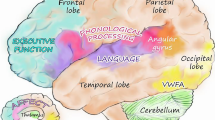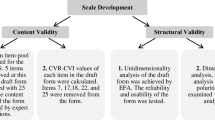Abstract
There has been very little research in Spanish on the potential role of prosodic skills in reading and spelling acquisition, which is the subject of the present study. A total of 85 children in 5th year of Primary Education (mean age 10 years and 9 months) performed tests assessing memory, stress awareness, phonological awareness, reading and spelling. In written language tests, errors were classified as phonological (grapheme-to-phoneme conversion rules) or stress-related (placement of the stress mark). Regression analyses showed that, once memory and phonological awareness were controlled, stress awareness partially explained reading and spelling performance as well as error type; however, differences were found between reading and spelling errors. These results show a relationship between prosodic skills—namely stress sensitivity—and the acquisition of reading and spelling skills that seems to be independent of phonological awareness skills.
Similar content being viewed by others
References
Carrillo, M. S., & Marín J. (1997). Test de eficiencia lectora TECLE [TECLE reading efficiency test] (unpublished).
Clin E., Wade-Woolley L., Heggie L. (2009) Prosodic sensitivity and morphological awareness in children’s reading. Journal of Experimental Child Psychology, 101: 197–213
Cowie R., Cowie-Douglas E., Wichmann A. (2002) Prosodic characteristics of skilled reading: Fluency and expressiveness in 8–10 year old readers. Language and Speech 45: 47–82
Cutler A., Mehler J. (1993) The periodicity bias. Journal of Phonetics 21: 103–108
Defior S. (2008) ¿‘Cómo estimular el aprendizaje inicial de la lectoescritura? Papel de las habilidades fonológicas. [How to stimulate initial reading and spelling acquisition? The role of phonological skills]. Infancia y Aprendizaje 31(3): 333–345
Defior S., Tudela P. (1994) Effect of phonological training on reading and writing acquisition. Reading and Writing An Interdisciplinary Journal 6: 299–320
Defior S., Serrano F., Jiménez Fernández G. (2009) Complexity and Lexicality effects in spelling acquisition in Spanish. Learning and Instruction 19: 55–65
Dupoux E., Peperkamp S., Sebastián-Gallés N. (2001) A robust method to study “stress deafness”. Journal of the Acoustic Society of America 110: 1606–1618
Ehri L. C., Nunes S. R., Willows D. M., Valeska Schuster B., Yaghoub-Zaden Z., Shananan T. (2001) Phonemic awareness instruction helps children learn to read: Evidence from the National Reading Panel’s meta-analysis. Reading Research Quarterly 36: 250–287
Goswami U., Thomson J., Richardson U., Stainthorp R., Hughes D., Rosen S., Scott S. K. (2002) Amplitude envelope onsets and developmental dyslexia: A new hypothesis. Proceedings of the National Academy of Sciences 99: 10911–10916
Gutiérrez-Palma N., Palma A. (2007) Stress sensitivity and reading performance in Spanish: A study with children. Journal of Research in Reading 30: 157–168
Gutiérrez-Palma N., Raya M., Palma A. (2009) Detecting stress patterns is related to children’s performance on reading tasks. Applied Psycholinguistics 30: 1–21
Holliman A., Wood C., Sheehy K. (2008) Sensitivity to speech rhythm explains individual differences in reading ability independently of phonological awareness. British Journal of Developmental Psychology 26: 357–367
Holliman, A., Wood, C. & Sheehy, K. (2010). A cross-sectional study of prosodic sensitivity and reading difficulties. Journal of Research in Reading. Advance online publication. doi:10.1111/j.1467-9817.2010.01459.x.
Kaufman A., Kaufman N. (1983) K-ABC—Kaufman assessment battery for children. American Guidance Service, Minnesota
Kitzen, K. (2001). Prosodic sensitivity, morphological ability, and reading ability in young adults with and without childhood histories of reading difficulty. Unpublished doctoral dissertation, University of Columbia.
Llisterri, J., Machuca, M. J., Mota, C., Riera, M. & Ríos, A. (2005). La percepción del acento léxico en castellano [Perception of lexical stress in Spanish]. In Filología y Lingü ística. Estudios ofrecidos a Antonio Quilis, 271–297. Madrid: Consejo Superior de Investigaciones Científicas. Universidad Nacional de Educación a Distancia. Universidad de Valladolid.
Miller J., Schwanenflugel P. J. (2006) Prosody of syntactically complex sentences in the oral reading of young children. Journal of Educational Psychology 98(4): 839–853
Perin D. (1983) Phonemic segmentation and spelling. British Journal of Psychology 74: 129 144
Pinnell G. S., Pikulski J. J., Wixson K. K., Campbell J. R., Gough P. B., Beatty A. S. (1995) Listening to children read aloud. US Department of Education. National Center for Education Statistics, Washington, DC
Protopapas A., Gerakaki S., Alexandri S. (2007) Sources of information for stress assignment in reading Greek. Applied Psycholinguistics 28(4): 695–720
Scarborough H. S., Ehri L. C., Olson R. K., Fowler A. E. (1998) The fate of phonemic awareness beyond the elementary school years. Scientific Studies of Reading 2: 115–142
Schwanenflugel P. J., Hamilton A. M., Kuhn M. R., Wisenbaker J. M., Stahl S. A. (2004) Becoming a fluent reader: Reading skill and prosodic features in the oral reading of young readers. Journal of Educational Psychology 96: 119–129
Serrano F., Defior S., Martos F. (2003) To be or not to be phonologically aware: A reflection about metalinguistic skills of student of teacher. In: Joshi R. M., Leong C. K., Kaczmarek B. L. J. (eds) Literacy acquisition: The role of phonology, morphology and orthography. IOS Press, Amsterdam, pp 209–215
Shattuck-Huffnagel S., Turk A. E. (1996) A prosody tutorial for investigators of auditory sentence processing. Journal of Psycholinguistic Research 25: 193–247
Troia G. A. (1999) Phonological awareness intervention research: A critical view of the experimental methodology. Reading Research Quarterly 34(1): 28–52
Whalley K., Hansen J. (2006) The role of prosodic sensitivity in children’s reading development. Journal of Research in Reading 29(1): 288–303
Wood C. (2006) Metrical stress sensitivity in young children and its relationship to phonological awareness and reading. Journal of Research in Reading 29(1): 270–287
Wood C., Terrell C. (1998) Poor readers’ ability to detect speech rhythm and perceive rapid speech. The British Journal of Developmental Psychology 16(3): 397–408
Wood C., Wade-Wolley L., Hoolliman A. J. (2009) Phonological awareness. Beyond phonemes. In: Wood C., Holliman A. J. (eds) Contemporary perspectives on reading and spelling. Routledge, London, pp 7–23
Ziegler, J., & Goswami, U. (2005). Reading acquisition, developmental dyslexia, and skilled reading across languages: A psycholinguistic grain size theory. Psychological Bulletin, 131(1), 3–29.
Author information
Authors and Affiliations
Corresponding author
Additional information
The manuscript is original, not previously published, and not under concurrent consideration elsewhere.
Rights and permissions
About this article
Cite this article
Defior, S., Gutiérrez-Palma, N. & Cano-Marín, M.J. Prosodic Awareness Skills and Literacy Acquisition in Spanish. J Psycholinguist Res 41, 285–294 (2012). https://doi.org/10.1007/s10936-011-9192-0
Published:
Issue Date:
DOI: https://doi.org/10.1007/s10936-011-9192-0




